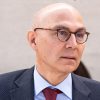By Will Bunch
I was offline, at least metaphorically, when news broke that Nelson Mandela had passed away. Thus, I had the luxury of reflecting for a couple of days… and watching a flurry of other stories whiz past in a blur. It’s remarkable how in our digital 21st century that any global event — but especially the passing of such an iconic world leader as the freedom fighter who became South Africa’s first black president — becomes a prism through which we funnel our view of the world, no matter how narrow. Sometimes it can be silly — Mandela the movie inspiration, or Mandela the rugby enthusiast — and sometimes it can be frustrating, especially when people with polar opposite beliefs try in some way graft his greatness onto their own cause.
But at heart, the music of Nelson Mandela and his life is what another icon of the so-called Third World, Bob Marley, might have called a redemption song, for his ideals and for the rest of us and came to believe, or at least accept, them. His notion that freedom and justice would happen for the downtrodden black people of apartheid-era South Africa — and his ability to hold onto that belief during 27 remarkable years in prison — never once wavered. That’s because he never lost faith that the rest of the world — the people who were calling him a “terrorist” and dismissing his pleas for equality as “communism” — would come to the rightness of his view.
To me, what’s amazing is not so much that this happened, but that it happens more than you would think. This weekend, many noted the unmistakable parallels between Mandela and the late Dr. Martin Luther King — freedom fighters who were vilified and imprisoned early in their life, only to become great national heroes. The one difference is that in America, Dr. King didn’t live to see his political beatification, a type of reverence that has both its good and weak points.
As Bob Herbert wrote the other day: “I knew that the tributes would be pouring in immediately from around the world, and I also knew that most of them would try to do to Mandela what has been done to the Rev. Dr. Martin Luther King Jr.: turn him into a lovable, platitudinous cardboard character whose commitment to peace and willingness to embrace enemies could make everybody feel good.” The reality, he noted, is a lot more complicated.
These aren’t the only people who went from behind bars to great moral triumph and even the leadership of their country. Both Poland’s Lech Walesa and the Czech Republic’s Václav Havel seemed to be fighting a lost cause in taking on the totalitarianism of the Iron Curtain, yet emerged victorious. Look at Muhammad Ail, who had to go all the way to the Supreme Court to avoid prison during the Vietnam era, and later became an ambassador and a symbol of this country.
It doesn’t always happen. Repression can be a cruelly effective tool, and their are many fundamentally evil regimes that remain empowered all over the globe. Still, when we think about these moments when a man or a woman with an idea can’t be contained by the iron bars around them, when something as graceful as a belief in justice and equal rights can defeat tanks and police dogs and fire hoses, it gives all of us something to hold onto, a reminder that Dr. King was speaking truth when he said famously that “the moral arc of universe is long but it bends towards justice.”
Yet it’s also hard to suppress the thought that a large number of the good citizens who today heap praise upon the late South African president — about his belief not just in justice but in democratic elections, in working with his rivals while still protecting the rights of a minority which in the case of Mandela’s homeland happens to be whites — are the same kind of folks (and in some cases the actual same people) who once celebrated his branding as a terrorist, who were grateful that he was behind bars. It is a sad thing of human nature — our desire to be a member of the herd and to chortle at the misfortune of the rebels who dare to question the status quo, At least until he or she wins.
When a great man like Nelson Mandela passes, it’s also common to wonder if we’ll ever see his kind again. But there’s no doubt that the Nelson Mandelas and Martin Luther Kings and Václav Havels of the 21st century are striding among us. But you can’t see it, because if he or she was shaking hands with world leaders and greeted by adoring throngs and serenaded by children’s choirs, then they wouldn’t be the next true Mandela or King or Havel.
No, the next Nelson Mandela of the world is rotting in a jail cell tonight, just like Mandela nearly withered for 27 years on Robben Island. Or he is on someone’s terrorist watch list, or she is segregated and searched every time she travels through an international airport. Somewhere, government spies are reading the emails of the next Nelson Mandela. They are tracking his cell phone and listening to his calls, or monitoring her meetings with their undercover cops.
Many of the other people who today are uttering bland platitudes about the dead Mandela will go back tomorrow to heaping scorns on the living ones. They are the shameless radio hosts and TV pundits and their army of dittoheads who see an advocate for justice and call him a “communist,” who look at someone who wants to liberate her people and brand her a “terrorist,” who find someone willing to live in a tent city to call attention to inequality and call them a urine soaked rapist, who lash out at someone who dares to believe in peace as “naive,” or a “dirty (bleep)ing hippie.”
The next Martin Luther King or Aung San Suu Kyi could be anywhere right now — advocating for gay rights in Putin’s repressive Russia, playing the piano in front of a line of riot police in Kiev, getting arrested in Raleigh to fight for the voting rights of minorities and young people or growing up in a small village in Pakistan, dreaming of peace even after a flying robot has killed his neighbors.
Today’s Václav Havel is fighting for the unspeakable today, so that the unspeakable will be normal by the time that he or she is old or dead. Gay rights are his segregated water fountains, economic inequality is her apartheid, fracking is his mercury poisoning.
The Nelson Mandela of the 21st century is right here, right now. We just can’t see it. We’re too busy spitting on him and calling him a terrorist.














